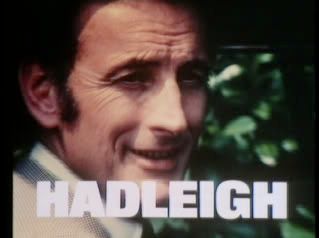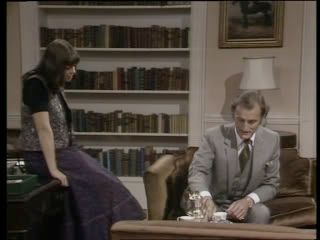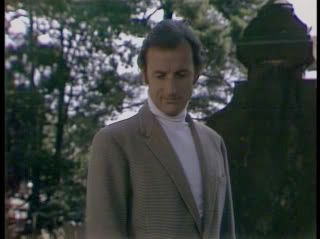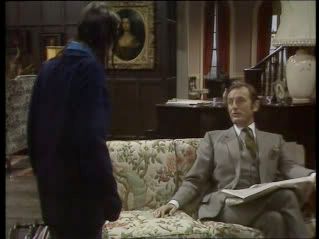

|
 |
Hadleigh: Series 4 (TV)
R2 - United Kingdom - Network Review written by and copyright: Paul Lewis (5th April 2009). |
|
The Show
 
As this fourth and final series of Hadleigh (Yorkshire Television, 1976) opens, Yorkshire landowner James Hadleigh (Gerald Harper) faces both the end of his relationship with his wife Jennifer (Hilary Dwyer), who Hadleigh married in the third series (see our review of the third series here), and his own financial difficulties. Having seen Jennifer off to New York following a decision to separate, Hadleigh is given a parking ticket by the airport’s traffic attendant; his financial problems are signalled by the manner in which he stashes the ticket in the glove compartment of his car, which a close-up reveals to be filled with similar tickets. The gesture symbolises the way in which the opening of this fourth series finds Hadleigh burying his head in the proverbial sand: returning to an event organised to facilitate a merger between Sir Geoffrey Osborne’s (Richard Vernon) company and Consolidated National, Hadleigh is similarly evasive about his relationship with Jennifer, refusing to offer straight answers to the guests who enquire about his wife’s whereabouts. In this final series, Hadleigh is forced to confront his problems: he must deal with the breakup of his marriage whilst also trying to maintain control of Melford Hall. However, his financial problems threaten to take Melford Hall from his grasp, and as a consequence much of this series involves Hadleigh trying to pull together the resources to save Melford Hall, through various schemes including allowing a film crew to use his family home as a location. Hadleigh also struggles to come to terms with Jennifer’s departure. In the commentary on ‘Broke’, Jacky Stoller asserts that in planning the third series of the show, she created the character of Jennifer as someone who was ‘fiery and independent, and would actually be a bit left-wing, and would put into question a lot of the things we had all taken for granted with the Hadleigh character’. We are told in the first few episodes of series four that Jennifer has left Hadleigh and has characteristically settled in an ‘artists’ colony’. Thus throughout this series, Hadleigh is melancholy. However, Jennifer’s departure was inevitable: as Stoller notes in the commentary, for female viewers Hadleigh had to be a James Bond-like ‘bachelor that they could lust after’. Likewise, Harper notes (in the commentary track) that an iconic element of the series was the sense of ‘melancholy’ amongst ‘all that richness’, and thus Harper had never agreed with the suggestion that Hadleigh should become married and settle down. On the other hand, other reasons are suggested for Jennifer’s complete absence from this fourth series of Hadleigh: in ‘The Lonely Man on the Hill’, Stoller is open about Hilary Dwyer’s ‘fiery’ temperament, which resulted in Dwyer being written out of one episode in series three (due to an ongoing dispute with Gerald Harper) and, it is suggested, her absence from series four. 
In the commentary for the final episode of the series (‘Broke’) and the documentary on disc four (‘The Lonely Man on the Hill’), producer Jacky Stoller expresses her desire in this final series to ‘shake his [Hadleigh’s] foundations’; this final series of Hadleigh was broadcast during the heavy recession of 1976, and Stoller suggests that she felt it was time for the character of Hadleigh to be confronted with the financial and personal difficulties that many viewers would have been experiencing during this period. (The fact that Network’s release of this fourth series of Hadleigh coincides with the current period of economic recession seems supremely ironic.) Stoller claims that in making this decision, she faced some opposition from members of the production team who wanted the character of Hadleigh to maintain his wealth and who perceived the show as a form of aspirational drama: her comments reflect the ongoing tension in Hadleigh between the escapist fantasy offered by the series’ glimpse into the life of the wealthy Hadleigh and the series’ attempts at social engagement. In other words, Hadleigh was a series that fell somewhere between glossy aspirational dramas like Howards’ Way (BBC 1985-90) and socially-relevant dramas such as Public Eye (Thames 1965-75). In ‘The Lonely Man on the Hill’, Stoller’s predecessor Terence Williams (the producer of the first two series of Hadleigh) asserts that every drama should have some form of ‘social relevance’, and from the first series this formed the backbone of Hadleigh, both as a series and as a character: as Williams notes, despite his wealth Hadleigh has a conscience and is ‘somebody who’s aware of his fellow man in a way that a lot of people aren’t’. Perhaps due to the problems that he faces in this series, the character of Hadleigh is even more melancholy here than in the first three series; in most of the episodes, he is a lonely and despondent figure. Following the event arranged to facilitate the merger with Consolidated National, Hadleigh is uncharacteristically cynical, stating that ‘Whenever I hear the government’s behind me, I like to know how far: just so’s I know when to duck’. Indeed, from the outset of this final series the character of Hadleigh is noticeably more ‘rough around the edges’, his good temper seemingly blunted by life. Stoller’s reign as a producer during the third and fourth series of the show clearly prevented Hadleigh from becoming another glossy aspirational drama and left the audience with a very poignant and thought-provoking final series of this much-loved programme. 
Disc Breakdown - Disc One: 1. ‘The Story of a Panic’ (49:31) 2. ‘God Save Us From Moralists’ (50:28) 3. ‘Bloodline’ (51:58) 4. ‘Echoes’ (50:22) Disc Two: 5. ‘Divorce’ (51:18) 6. ‘The Charm Factor’ (52:24) 7. ‘Film Story’ (48:17) Disc Three: 8. ‘Hong Kong Rock’ (52:19) 9. ‘A Household of Gamblers’ (50:49) 10. ‘Time Out’ (51:50) Disc Four: 11. ‘Incident’ (51:26) 12. ‘Favours’ (48:45) 13. ‘Broke’ (52:08) Special Features: Audio commentary on ‘Broke’, by Gerald Harper and producer Jacky Stoller Documentary: ‘The Lonely Man on the Hill’ (60:45)
Video
Shot on a mixture of videotape (for in-studio footage) and 35mm film (for location work), the fourth series of Hadleigh gets a handsome presentation on this release from Network. The image is crisp and detailed, with relatively little wear and tear. 
The episodes are presented in their original broadcast screen ratio of 1.33:1. ‘The Lonely Man on the Hill’ is presented in a ratio of 1.78:1, with anamorphic enhancement. The original break bumpers are intact.
Audio
Audio is presented via a two-channel mono track. This is crisp and clear. There are no subtitles.
Extras
Earlier releases of Hadleigh have been devoid of any contextual material. However, with this release of the final series of the show Network have included some very good bonus content. A commentary with producer Jacky Stoller and star Gerald Harper accompanies the final episode of the series, ‘Broke’. Stoller and Harper offer much insight into their working relationship and the philosophy of Hadleigh. Stoller discusses how she landed the role as the producer of Hadleigh for the third and fourth series of the show, following the departure of Terence Williams. She also discusses the ways in which she tried to rebrand the series slightly, by commissioning a new theme tune and titles sequence. Further to this, Stoller also discusses the way in which she tried to integrate demands that Hadleigh become married, and her attempt to create a female character who could offer a challenge to Hadleigh’s ideas and way of life (in the form of Jennifer). Harper and Stoller also discuss the structural differences between the first two series of Hadleigh and the third and fourth series, which they suggest shifted the focus away from self-contained narratives to ongoing narratives that would last throughout several episodes. They also discuss the differences in producing television drama now as compared with the 1970s. Stoller concedes that ‘it’s really quite hard’ now for a producer, due to ‘so many people interfering above you’. Harper suggests that it is for these reasons that he enjoys theatre more than television; he asserts that he prefers the freedom that theatre work offers him. Disc four also includes a documentary entitled ‘The Lonely Man on the Hill’ (60:45). The documentary features interviews with Harper and Stoller, whose comments sometimes overlap with the topics covered in their commentary, several of the co-stars (including Jon Laurimore and Jane Merrow) and Terence Williams, the producer of the first two series of Hadleigh. The first half of the documentary covers Williams’ reign as producer, examining Hadleigh’s development out of the earlier series Gazette and Williams assertion that television drama should always have some form of ‘social relevance’. The interviewees discuss the appeal of Hadleigh as a character; Stoller claims that Hadleigh appeals to viewers because he ‘was a man who was very much in control’, whilst Peter Dennis asserts that the character’s appeal was grounded in the fact that he was ‘the lonely man on the hill who has everything in the world except what he wants’. The second half of the documentary covers Stoller’s era as producer and the changes that Stoller made to the series’ format. The majority of the discussion revolves around the decision to allow Hadleigh to marry in the third series, and the cast and crew’s relationship with Hilary Dwyer, and the decision in the fourth series to undermine Hadleigh’s foundations through making the character go through bankruptcy. As noted above, some of the comments in the documentary overlap with the topics discussed in the commentary, but the participants are always engaging and their recollections are vivid. Both of these features are wonderful attempts at contextualising the series, and their inclusion here is to be praised.
Overall
Prior to Network’s release of Hadleigh, I had always avoided watching the series as I had assumed that it was simply another aspirational drama. However, Hadleigh is in fact a drama with a social conscience and a leading character who has a strong moral compass. Where previous series of Hadleigh have offered food for thought, this final series is particularly poignant in the way that it depicts the collapse of Hadleigh’s lifestyle, forcing the character to deal with a series of very real problems. Hadleigh is a very good series, and the inclusion of some excellent contextual material ensures that this release comes with a strong recommendation. For more information, please visit the homepage of Network DVD.
|
|||||

|